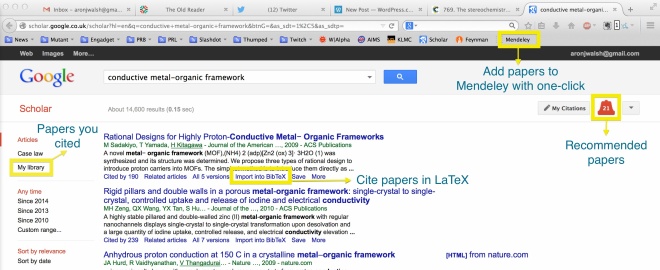[fade to black and white] I remember hunting down a series of 1950s papers on sterochemical lone pairs by L. E. Orgel at the start of my PhD. There was the wonderful satisfaction of finding the right volume of the journal, photocopying the paper, and then curling up in the corner of the library basement to read it. If I started this year, a quick web search just sends me to the right place.
Immediate access to information is useful, but it makes it increasingly difficult to navigate the expanding literature. Even in my general area of computational materials chemistry, there are too many journals, papers and authors to keep track of. My current workflow involves the following web services:
- Google Scholar. The commercial Web of Science and Scopus search engines are quickly becoming redundant. Google is faster and more effective. There are some nice features such as direct export to BibTeX, and access to pdfs that you may not have subscriptions to (e.g. stored on personal websites or online databases). There is also a surprisingly accurate alert system, which gives you recommended reading based on the papers you have published and cited.
- Mendeley. On one hand, Mendeley is useful for sharing papers. I use it for maintaining a list of publications in the emerging field of hybrid perovskites, for keeping track of our journal club, and an essential reading list for new students. The desktop client is also very useful for synching pdfs across machines (including notes and annotations), and for maintaining a bibliography for LaTeX or Word documents. The cite-as-you-write feature has now made Endnote redundant (which has always been a clunky and error prone piece of software). Mendeley is particularly smart at importing missing database entries when you edit a collaborator's document.
- Old Reader. Since the early death of Google Reader, I tried out many options for tracking RSS feeds from journals in my field. Eventually, I settled with the Old Reader. As the name suggests it maintains the functionality of Google Reader. It is fast and displays TOC art quite nicely. The alternative is weekly alert emails from journals, but I enjoy my morning coffee browsing through the new articles of the day (caffeine and new science are equally addictive).
